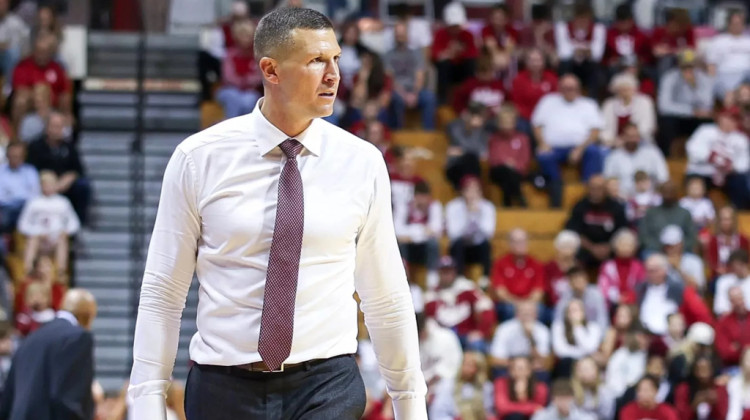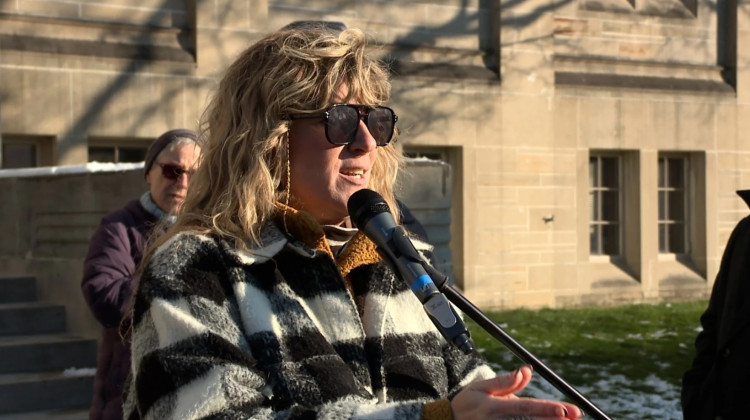
IPS Board President Mary Ann Sullivan and Superintendent Lewis Ferebee during a school board meeting.
Eric Weddle/WFYI Public MediaTwo taxpayer referendums worth nearly $1 billion were approved unanimously by the Indianapolis Public Schools Board Thursday to be placed on the May primary ballot.
It marks the largest property tax increase ever sought by the district. IPS has not sought an increase since its successful campaign in 2008.
District officials say the new funds are essential to ensure annual pay raises for teachers, enhance special education services and improve safety and security measures at all buildings.
Without the funding, the IPS officials say, a hiring freeze on teachers and staff, cuts to academic programs and reduced transportation services.
“Our goal ultimately is to ensure our students receive the highest quality education that they are entitled to,” says IPS chief of staff Ahmed Young. “In order to do that we have to presume this referendum on the operating and capital side."
The referendums come as the district remakes its high school offerings, closes multiple under-enrolled schools and continues to partner with charter school operators and other outside groups to manage failing district schools.
The two referendums total $936 million: a $200 million capital referendum and an approximate $736 million operating referendum that would be generated by $92 million per year for eight years.
The total monthly impact on homeowners is projected to be $28.45 per month for the owner of a $123,500 home, the median home value within IPS boundary in Marion County, according to IPS.
In 2008 IPS passed a $278 million capital referendum with 78 percent voting in favor.
Eight other Marion County districts have attempted capital and/or operating referendums since 2008. Of those,15 passed and four failed.
Superintendent Lewis Ferebee says the need for new revenue comes after years of cuts in state and federal funding, a total of around $24 million since 2010. Property tax cuts caused $16.8 million in annual lost funds since 2011, according to district officials.
“Coupled together, our investment in our employees to ensure that we are competitive to attract and obtain the best for our students and our families and reduced funding — there is a need to ensure that we have additional resources for years to come,” Ferebee says.
During a public hearing before the vote, some questioned whether the IPS administration would use the new money to fix up building only to sell them at reduce rates to charter school companies,. Others asked if there's enough financial transparency to warrant more tax-payer dollars.
Charity Scott, a member of the IPS Community Coalition, pointed to a 2014 analysis of the district’s finances by the Council of Great City Schools. The report, requested by Ferebee, detailed shortcomings in district business practices.
While the district has increased controls, reports and public meetings on district finances, Scott says the district did not follow one recommendation, to produce a comprehensive annual financial report.
“If IPS had done this three years and half years ago I am quite certain constituents would vote in favor of this referenda,” Scott says.
Ferebee rejected the criticism after the meeting.
"I love the transparencey questions because we have raise the bar,” he says, noting that the district does not produce a yearly report but a quarterly report that contains projections of revenue and actual costs. "We have exceded expectations."
Here's a look at the two referendums:
Operating Referendum
Generate approximately $92 million as an annual allocation for eight years for teacher salaries and academic services:
- Teacher attraction retention and recruitment, expand academic programs and continue to provide exceptional support and services for students with special needs.
- Provide all employees with up to a 2 percent annual cost of living increase and maintain health care benefits as cost-neutral for employees for eight years.
- Calls for a proposed local property levy of no more than $0.59 on each $100 of assessed valuation.
Capital Referendum
Generate $200 million to fund the myIPS Safety, Security and Technology Project, which includes:
- Enhancing safety and security at all IPS-owned facilities.
- Renovating and improving school facilities to address maintenance needs.
- Upgrading classroom technology and equipment by investing in energy efficient technology to reduce annual operating costs across the district.
- Calls for a proposed local property levy of no more than $0.1384 per $100 of assessed valuation.
Contact WFYI education reporter Eric Weddle at eweddle@wfyi.org or call (317) 614-0470. Follow on Twitter: @ericweddle.
 DONATE
DONATE






 View More Articles
View More Articles



 Support WFYI. We can't do it without you.
Support WFYI. We can't do it without you.